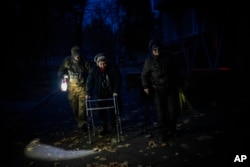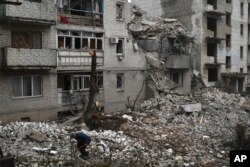NATO foreign ministers are to meet for two days in Romania’s capital Bucharest starting Tuesday to pledge their continuing support of Ukraine against Russia’s invasion.
At a news conference Monday, after a meeting with Romania’s President Klaus Iohannis, NATO Secretary-General Jens Stoltenberg asked the alliance to step up its support in the region. “Investing in our defense,” he said, “is essential as we face our greatest security crisis in a generation.”
In response to Russia’s aggression against Ukraine, he said, NATO is reinforcing its presence from the Baltics to the Black Sea region.
The head of the alliance also said new battlegroups have been set, including one led by France in Romania, while fighter jets from Canada are helping to “keep our skies safe,” and U.S. Patriot missiles are boosting NATO defenses. “We will do what is necessary to protect the defense of all our allies,” he added.
Stoltenberg also highlighted the support of other partners facing Russian pressure, such as Bosnia Herzegovina, Georgia, and Moldova.
Romanian President Klaus Iohannis said the decision reached at the Madrid summit to boost NATO troops and military equipment on the alliance’s eastern flank needs to come into force as soon as possible.
Stoltenberg reiterated NATO’s commitment to approve membership for Sweden and Finland, which would expand NATO’s eastern flank.
Stoltenberg said Russia is weaponizing winter by striking Ukraine’s critical power infrastructure and leaving civilians without power, heat or water in freezing temperatures.
“We cannot let Putin win,” Stoltenberg said. “This would show authoritarian leaders around the world that they can achieve their goals by using military force — and make the world a more dangerous place for all of us. So, it is in our own security interests to support Ukraine.
“We need to be prepared for more attacks,” the NATO chief added. “That is why NATO has stepped up its support to Ukraine with additional air defense systems, such as … drones as well as cruise and ballistic missiles.”
Meanwhile, Ukrainian Foreign Minister Dmytro Kuleba welcomed his Nordic and Baltic counterparts from Estonia, Finland, Iceland, Latvia, Lithuania, Norway and Sweden in Kyiv.
“The strongest message from this visit is: Ukraine needs to win this war and therefore … Western support should be stronger; more heavy weaponry without any political caveats, also including long-distance missiles,” Estonian Foreign Minister Urmas Reinsalu told Reuters in an interview.
Ukraine said Monday it had been forced to impose regular emergency blackouts in areas across the country after a setback in its race to repair energy infrastructure hit by Russian missile strikes.
Power units at several power stations had to conduct emergency shutdowns and the demand for electricity has been rising as snowy winter weather takes hold in the capital and elsewhere, national grid operator Ukrenergo said in a statement.
“Once the causes of the emergency shutdowns are eliminated, the units will return to operation, which will reduce the deficit in the power system and reduce the amount of restrictions for consumers,” it said.
DTEK, Ukraine’s biggest private electricity producer, said it would reduce the electricity supply by 60% for its consumers in Kyiv, where temperatures are hovering around zero degrees Celsius (32°F).
“We are doing everything possible to provide power to every customer for 2-3 hours twice a day,” DTEK’s Kyiv branch wrote on Facebook.
Ukrainian President Volodymyr Zelenskyy said late Sunday the coming week could be as difficult as the past week when Russian missile strikes caused widespread damage to the country’s electrical grid.
“We understand that the terrorists are planning new strikes. We know this for a fact,” Zelenskyy said. “And as long as they have missiles, they, unfortunately, will not calm down.”
Russian airstrikes have repeatedly struck key infrastructure targets in Ukraine, knocking out important services as the winter season looms. Russian officials have denied targeting civilians with such strikes.
Continued US support
Newly empowered U.S. Republican lawmakers set to take leadership roles in the House of Representatives in January promised Sunday that Congress would continue to support Ukraine militarily in its fight against Russia but said there would be more scrutiny of the aid before it is shipped to Kyiv’s forces.
Congressmen Michael McCaul of Texas and Mike Turner of Ohio told ABC’s “This Week” program there would be continued bipartisan Republican and Democratic support for Ukraine as Republicans assume a narrow House majority, even though some opposition from both parties has emerged.
Turner, likely the new chairperson of the House Intelligence Committee, said, “We’re going to make sure they get what they need. We will have bipartisan support.”
McCaul, the likely head of the House Foreign Affairs Committee, said, “If we give them what they need, they win.”
But McCaul said there would be a difference in considering Ukraine aid from the outgoing Democratic control of the House when Republicans take over.
“The fact is, we are going to provide more oversight, transparency and accountability,” he said. “We’re not going to write a blank check.”
Some material for this report came from The Associated Press, Reuters and Agence France-Presse.


